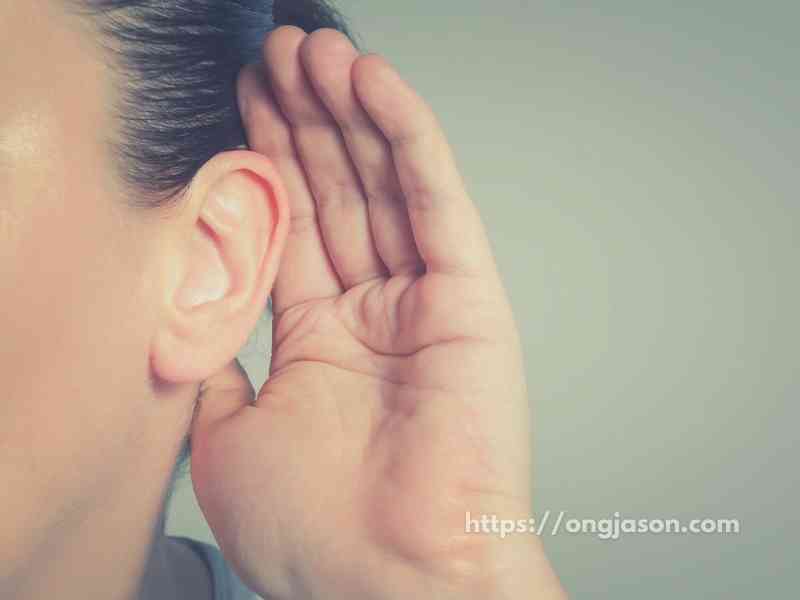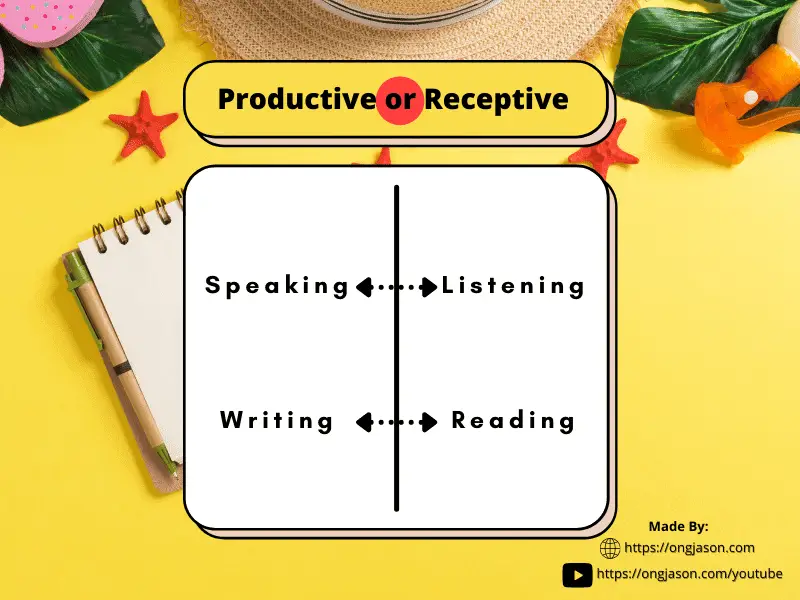Receptive Skills: What are They? | Definition and Importance
In studying a language or communication, receptive skills are one of the most important skills you need to develop. I remember when I was a student and my teachers start teaching the concept of receptive skills. They always tell us that the goal of studying English or any language is to increase our productive and receptive skills. But what do receptive skills actually mean?
The meaning of receptive skill is the skills that we use to receive a language. These are skills that we use to understand what others tell or write to us. Receptive skills are a means of measuring a person’s proficiency in a language. This includes listening and reading.
Receptive skills are meant to be used for receiving a language. It is how you unpack the information given to you by the one you’re speaking with. It can also be from understanding what someone is reading. While I already gave the meaning or receptive skills, it doesn’t mean that it ends there. This article would give you more insights and a deeper understanding of the topic. Furthermore, I am going to give you reasons to take studying these skills seriously.

What are receptive skills
Receptive skills are skills we use to understand a language. It is meant to put together the language into something that we could understand. In short, they are one of our means of communicating properly with others. Receptive skills include listening and reading skills.
When we talk about receptive skills, it can be easily explained by having our ability to process the information given to us.
For example, when I am writing this article, my hope is for you to understand what I’m writing. Thus, what I am giving you is information to process.
However, these are just texts and words jumbled together. It is the same with speaking where someone gives you random tones, pronunciation, and such.
Our ability to process that information, to cover what it means based on definition and context is our receptive skills.
Studying receptive skills is not as simple as giving a lecture about the topic and you’ll instantly get better at it.
Receptive skills are a collection of the topics that you have studied in the language so far.
It is an indicator that you’ve learned something in your language class whatever language it might be. Of course, that includes English.
Thus, it is not something that can be learned in 1 sitting. In fact, receptive skills require us to learn not just in class, but in experience as a whole.
When I became a lecturer, I practiced a lot of my speaking skills. When I started to write, I practiced how to write properly.
That is the same for receptive skills. When I study how to speak in public, I also learned to listen to what others are commenting on in my lectures.
Without knowing how a person would understand what I’m teaching or speaking, I wouldn’t be able to give proper lectures.
Without knowing my audience, I wouldn’t know how to write properly. I should make my writing understandable to, if possible, all my audience. That’s why I always explain in greater detail and repeat the main points.
To make my writing understandable, I should also know how to understand it.
Those are receptive skills that I developed through experience. Of course, it is hard to replace a proper education. That’s why it is important for you to understand more about the importance of receptive skills which we will discuss later.
But for now, I would want you to understand this. Receptive skills are a part of the communication process. It is our ability to process the information given to us into something that we can understand. In short, it is our ability to process and receive information.
If you’re interested in learning about the opposite of receptive skills which is productive skills, then you may check out this article: What are productive skills?

What are the 2 core receptive skills?
The two core receptive skills are reading and listening. Reading and listening are the main things people use to receive information. Thus, they are the main or core receptive skills. Receptive skills are what we use to receive information from others
Now, let’s discuss more on the 2 core receptive skills.
First of all, why only 2?
The reason why there are only two receptive skills is that listening and reading are our only means to receive information. Building these skills is the foundation of receptive skills.
That’s basically the reason why there are only 2. As of now, there isn’t any other way to receive information from others other than listening and reading.
However, there might be a possibility of having more. But what that might be, I don’t know and I don’t even know if that’s possible.
The reason why I’m saying this is because when we look at history, the first one that came out when it comes to our receptive skills is listening. Reading only came after we learned how to write.
So, while it is hard to think of, there might be a possibility for that.
But for now, we only have two.
For you to easily understand reading and listening as the 2 core receptive skills, you may check out the photo above. But of course, I will still explain it here.
The best way to explain this is by giving you an example.
When we are talking about receptive skills, we first need to know about productive skills. So when learning how to read and listen, we first need to understand its relationship to writing and speaking.
| Productive Skills | Receptive Skills |
| Speaking | Listening |
| Writing | Reading |
Basically, the relationship between productive skills and receptive skills can be seen by their cores.
Productive skills have 2 cores: Speaking and listening. While receptive skills also have 2 cores: Listening and Reading
You can link them by productive skills giving the information and receptive skills are getting the information.
So when I am writing this, you are reading this.
I am doing my best to help you understand, which is a productive skill. And you are also doing your best to understand which is the receptive skill.
When your friend is talking to you, you are listening to them.
Both are very important in the communication process and neither can work alone.
I have made an article about the similarities and differences between productive and receptive skills, I think it is a good addition to reading this article if you’re interested in learning their relationship with each other. Here is the link: What is the difference between productive and receptive skills?

Why receptive skills are important?
Receptive skills are important because it is a means we use to communicate properly with others. The reason is humans are social creatures and communication is part of our daily lives. Furthermore, excellent receptive skills allow us to have more career opportunities in the future.
In this section, we would understand more about the importance of receptive skills. Here, I have identified 4 obvious benefits or importance of having good receptive skills.
Remember that my goal here is to give you a better idea of why you should study receptive skills. These can be used by teachers to let students know why they’re studying, or to if the reader is a student, then it is to give some reasons to study this seriously.
Another reason for giving this section is because I know the importance of knowing why you’re studying. This is very related to my other article discussing why studying gets boring. I made that article to help students in case they’re wondering why they always get bored and fall asleep when trying to study. You may find it here: Why is studying so boring?
1. Receptive skills help a person communicate properly
As I explained earlier, there are two parts when talking about communication, productive and receptive skills.
Both of which are important because communication is a process of listening or reading in what others are speaking or writing.
Thus, a good set of receptive skills that come from studying and experience helps you get better at communicating.
Most of the reasons here would be related to this. I just want to make things obvious so that no one can miss receptive skill’s benefits.
2. Receptive skills is a way to measure a person’s proficiency in a language
Receptive skills are good indicators of a person’s language proficiency. This is one of the receptive skill’s importance.
This is especially true in all languages and even when learning a second language.
A teacher can use this to quickly get an assessment on the student’s level in the language.
As a student, you can easily notice this because you will instantly know your language proficiency using receptive skills.
Basically, when you can understand what others are saying, then your receptive skills are good enough. However, understanding doesn’t mean that you’ve mastered receptive skills as language is becoming harder and harder depending on who you’re speaking with.
The perfect example here is that some people who attained a higher degree in language can sometimes speak words that we don’t encounter every day.
That’s why, even for me, I am still improving my receptive skills even after graduating from school.
3. Receptive skills promote better relationship to others
Remember that we are social creatures. Thus, we always communicate with others.
Imagine talking to someone who only loves talking about themselves without listening to anybody.
Receptive skills give us the ability to listen, which is a big part of the communication process.
Listening is very important in improving relationships with others and shows that you care or are genuine.
This is also true when talking about career opportunities in which relationships with others are very important.
4. Receptive skills open a lot of career opportunities
When talking about getting a job, building a business, or career, it is important to have good relationships with as many people as possible.
While it is impossible to make everyone like you, we can become more likable when we learn how to listen to others.
As I said, you just instantly become more genuine if you are listening to others.
This brings more career opportunities as you would generally have more friends that care about you.
But that isn’t all.
Some career requires us to listen to others. One such example is sales.
When talking about sales, there is a famous saying: “You have 2 ears and 1 mouth,”
That means that in selling, you need to listen to others. Listen what your customer is saying because you can quickly get what they need.
While speaking is giving information, listening is learning more information. This is especially true for sales because the goal in sales is to find out what the person actually needs.
For example, if you are a real estate agent, then selling a studio apartment for a family of 5 is a terrible idea.
How would you know about a person’s needs without listening?
But as I said, this is not just in sales. This is also true for many career opportunities like marketing, engineers, accountants, and many more.

“Only the things I love.“
ongjason.com is reader-supported. When you buy through links on the site, I earn an affiliate commission.
If you’re following me, you’ll know that I believe it is essential to have some tools, whether it’s for personal development or lifestyle in general.
So, here are the things I love.
YouTube
If you want to learn things for free, I recommend watching my YouTube Channel. Click the Button Below to go straight into my Channel. 🙂
Okay, let me first explain my Channel.
I believe that I really can’t explain everything too well on my blog. That’s why I created a YouTube Channel so I can easily explain a lot of things. Plus, I believe that Video Sharing is the future.
Recommended Books
The next thing is books. Books are, for me, one of the cheapest ways to get invaluable information. We can learn personal development, finance, career, relationships, and many more from books.
Here, I will be listing my favorite books in different categories.
- For Beginners – 7 Habits of Highly Effective People by Stephen Covey – Personal development has a lot of concepts and ideas to learn. Thus it can be really hard for beginners to know where to start. Thus, I recommend this book since all the basic concepts of personal development are here(except finance, check what I recommended for that)
- Productivity – The One Thing by Gary Keller – This book teaches us the power of focusing on one thing which is the ultimate source of productivity. The concepts taught are what I am using to constantly publish YouTube videos while maintaining this website.
- Busy? – Make Time by Jack Knapp – This book teaches us how to make time for the things we love. The concept is really simple but I think that makes it a book worth reading.
- Health – Lifespan by Dr.Sinclair – This Book teaches about the latest scientific research on lifespan. In his book, he has shared numerous things he is doing to slow down his aging process. This can be as easy as eating less which he recommends.
- Finance – The Richest Man in Babylon by George Clason – Perhaps one of the first books I’ve read about Finance, this book for me is the best if we are talking about learning basic finance such as basic saving and investing. The concepts are very simple but effective.
Audiobooks
Take this advice as a grain of salt.
I don’t recommend buying Audiobooks one by one. I mean, audiobooks can be quickly finished by listening while working out or doing some mindless tasks.
So here is to save you some money. Just go for a monthly subscription to Audible. I believe that you will save a lot of money with that plus, they usually give freebies to anyone starting.
My Audiobook Recommendation will always be the same as my book recommendations, but I personally like The 5 Second Rule by Mel Robbins. I like how she is so casual while reading her book.






